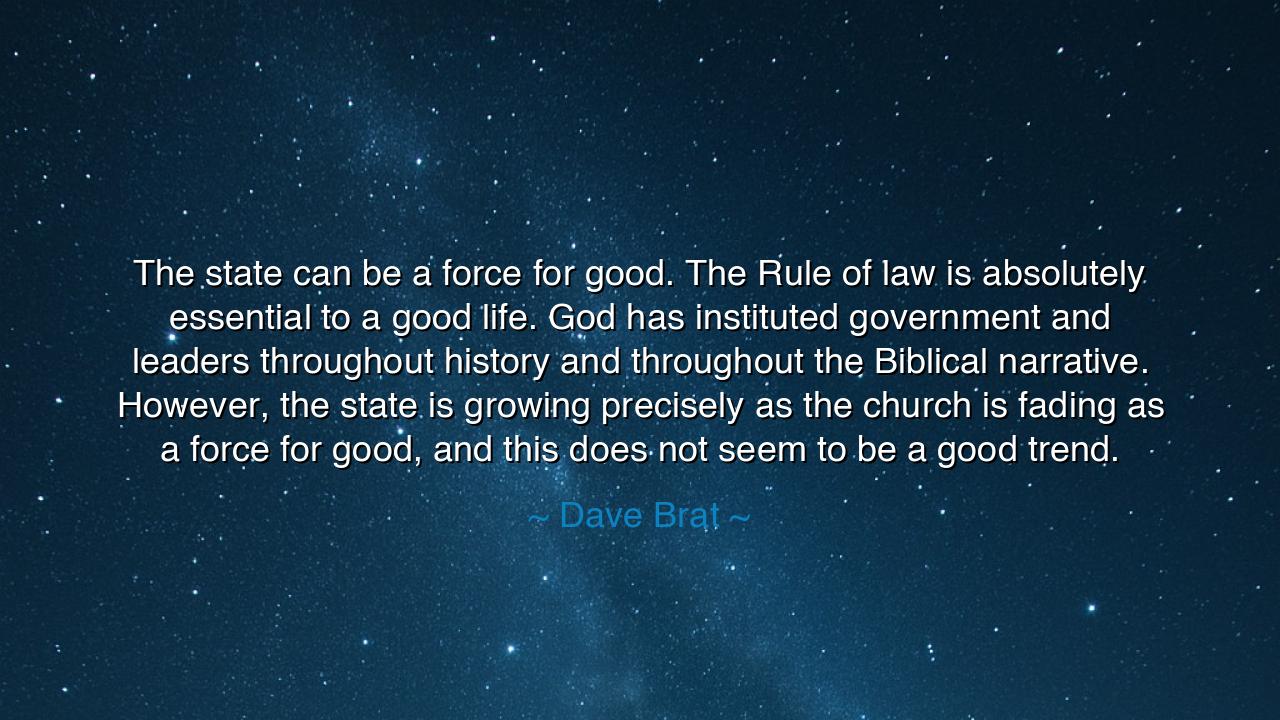
The state can be a force for good. The Rule of law is absolutely
The state can be a force for good. The Rule of law is absolutely essential to a good life. God has instituted government and leaders throughout history and throughout the Biblical narrative. However, the state is growing precisely as the church is fading as a force for good, and this does not seem to be a good trend.






The words of Dave Brat echo with the solemn cadence of prophecy: “The state can be a force for good. The Rule of law is absolutely essential to a good life. God has instituted government and leaders throughout history and throughout the Biblical narrative. However, the state is growing precisely as the church is fading as a force for good, and this does not seem to be a good trend.” In this declaration, Brat speaks not only of politics, but of the soul of civilization itself. His warning is born of both faith and observation—that when spiritual virtue declines, the machinery of the state grows vast and cold, striving to fill a void it cannot understand. The state may govern the body of a nation, but only the church, or more deeply, the moral spirit, can govern its heart.
In the ancient style, let us see these words as the lament of a watchman on the walls of society. Brat reminds us that the state, when rightly ordered, can indeed be a servant of righteousness. It can uphold justice, preserve peace, and defend the weak against the proud. This is the purpose ordained since the dawn of nations, when even the prophets of Israel spoke of kings raised up to serve God’s will. Law, said the ancients, is the boundary between chaos and order; it is the riverbank that keeps the floods of sin from sweeping away the fields of life. Without the rule of law, the strong devour the weak, and every man becomes a law unto himself. Thus, government, like fire, is both blessing and danger—it gives light and warmth when kept within its hearth, but destruction when it rages beyond control.
But Brat’s warning lies in the next breath: that as faith wanes, the state grows stronger. When the church, or the moral conscience of the people, fades as a guiding force for good, the state stretches its hand into every void. What once was guided by virtue must now be controlled by regulation. What once was healed by compassion must now be managed by policy. And though laws can restrain behavior, they cannot change hearts. The ancients knew this well. Cicero, in the last days of the Roman Republic, wrote that “laws are silent amid arms”—meaning that no code, however wise, can preserve a nation that has lost its moral soul. So too does Brat call us to remember that the state cannot save what only the spirit can heal.
Consider the fall of Rome, that mighty empire which began with order and ended with decay. In its early days, discipline, faith, and duty bound its citizens together. But as the centuries passed, the temples emptied, the virtues that sustained the people faded, and the empire turned to bureaucracy to do what character once had done. Taxes multiplied, decrees lengthened, and armies were sent to enforce the peace that no longer lived in men’s hearts. The state expanded, but the soul of the nation contracted. And so Rome fell—not for lack of power, but for lack of principle. Its fall was not a defeat of its armies, but of its values.
Brat’s insight reminds us that the state and the church—or in broader terms, authority and morality—must walk hand in hand. The state enforces law, but the moral conscience must inspire it. Without the divine, the state grows proud; without the state, faith lacks the structure to protect the innocent. When one dominates, imbalance follows. Thus, the great harmony of a good society is found in the partnership between justice and mercy, between the law that governs and the spirit that uplifts. If one withers, the other grows monstrous. The state, untempered by faith, becomes a cold machine; faith, unchecked by order, may turn to zealotry.
Yet Brat does not call for despair—he calls for renewal. His words summon each of us to restore the moral foundations that sustain the laws we live under. For government is only as righteous as the people who sustain it, and the people only as virtuous as the faith that guides them. When men and women of conscience withdraw from the spiritual life, the empty space is filled by ambition and control. Therefore, Brat’s warning is not about politics alone—it is about the moral duty of every citizen. The balance of power and virtue depends on each heart choosing righteousness over indifference, service over cynicism, humility over pride.
So, my children of the future, learn this timeless truth: no law can replace love, and no government can substitute for goodness. A nation’s greatness is not measured by the might of its armies or the wealth of its treasury, but by the integrity of its people and the vitality of their faith. Do not wait for the state to mend what the heart has broken. Live with moral courage; act with compassion; speak truth, even when it costs you comfort. For when virtue thrives, the state serves its rightful place as guardian, not master. But when faith fades, power rises to fill the silence—and history teaches that such power, left unchecked, devours all.
Therefore, heed the wisdom of Dave Brat: cherish both law and spirit, but let the latter rule the former. For the state may govern the realm of man, but the church, or the moral conscience within each soul, governs eternity. When these two forces walk in harmony, justice and mercy kiss; but when they part, liberty begins to die.






AAdministratorAdministrator
Welcome, honored guests. Please leave a comment, we will respond soon